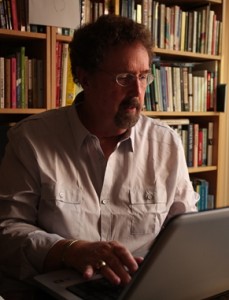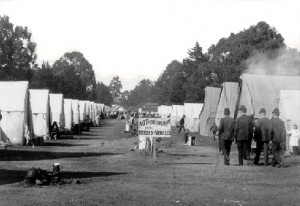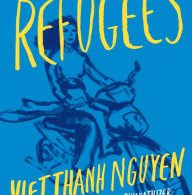 When I heard about Shaken: Stories for Japan, the first ever charitable e-book, I knew I wanted to help spread the word. Like everyone else, I was horrified by the disasters in Japan and, because of my childhood, I also know what it’s like to lose everything you own.
When I heard about Shaken: Stories for Japan, the first ever charitable e-book, I knew I wanted to help spread the word. Like everyone else, I was horrified by the disasters in Japan and, because of my childhood, I also know what it’s like to lose everything you own.
The anthology was conceived and edited by Edgar-nominated author Tim Hallinan, who wrote a Japan-themed short story for the anthology and got 19 of his friends to do the same. Author Gar Anthony Haywood created the striking cover. The e-book became available last week on Amazon for $3.99 and the authors are donating all their royalties to the 2011 Japan Relief Fund.
I reached out to Tim and three of the writers—Brett Battles, Naomi Hirahara, and Kelli Stanley—on Friday about doing a Q&A with me and immediately got enthusiastic yeses. Despite their busy schedules (Naomi co-chaired the California Crime Writers Conference this past weekend), they made time for my questions and even sent photos. I think I got a glimpse of the generous spirit everyone has devoted to the project.
Below, the authors discuss their experience with Shaken.
Pop Culture Nerd: If someone can afford to buy only one thing to help out Japan, why should it be Shaken instead of the various other charitable items out there?
Tim Hallinan: The book, as wonderful as it is, is a means to an end, and the end is helping people who have endured one of the new century’s most unimaginable tragedies. One strong argument in favor of the book is that we did a lot of research into the organization to which we would give the project. They had to take nothing for overhead and supervision. Some charities take as much as 40-45%, and the funds could not be regarded as fungible, meaning they couldn’t be diverted to another cause at the organization’s whim. Japan America Society not only met those criteria, but also demonstrated that the organizations to which they gave the money—already active in the disaster area—were similarly clean, were nonprofit and nongovernmental groups that would put every penny to use.
Brett Battles: Not only is 70% of the donation going directly to the relief fund, but you also get something very cool in return! And at $3.99, it’s like buying a latte at the coffee shop. Purchasing a copy of Shaken is easy, inexpensive, and good for the soul.
Naomi Hirahara: The nice thing about this project is that writers donated their time to create short stories that, hopefully, entertain. So by buying Shaken, readers will get something of value while benefiting victims of the earthquake. We [the writers], as Americans and Europeans, also attempted to make connections to things Japanese, so certainly there’s an element of intercultural dialogue going on.
Kelli Stanley: I really can’t recommend one charitable donation over another—especially if someone has more than $3.99 to donate!—but I will say this: If you enjoy reading, and if you enjoy crime fiction, I think buying and reading Shaken will give you a great deal of pleasure, as well as insight into Japan and Japanese history and culture. The experience will make you feel doubly good about being able to help! Plus, we are hopeful that the success of Tim’s idea will spur other author-driven projects for charity!
PCN: Why did you choose to write and contribute the story you did?
TH: I’ve wanted for years to set a book in the age of silent pictures, when a few people were inventing an art form and an industry at the same time. And I’ve been fascinated for years by Anna May Wong and Sessue Hayakawa, the first two Asian stars in Hollywood. I looked up the most disastrous of all Japanese quakes, in terms of lives lost, and there it was: the great Kanto earthquake of 1923, which killed more than 100,000 people and essentially leveled Tokyo. I wondered what it would be like to be a Japanese actor starring as yet another Yellow Peril villain when the news of that earthquake finally reached Los Angeles. That was the seed of the story, and the title, “The Silken Claw,” which obviously means nothing whatsoever, immediately came to me as the title of the film my hero was making when this life-changing news reached him.
Let me also say that I took one look at the first few stories that came in and rewrote mine from the first word to the last. In its original form it was nowhere near good enough to be in a book with the stories the other writers turned in.
BB: At first I considered something set in Japan, but I knew a lot of the other authors would be doing that. I finally decided I’d write a story set in the world of Jonathan Quinn, the protagonist of my [The] Cleaner series, hoping that this would interest some of the series’ fans to pick up the anthology. But I didn’t want to write a Quinn-centric story. I wanted to do something a little different. So I decided to write a story featuring Quinn’s girlfriend Orlando from back when she was just starting in the espionage business. She’s given a simple assignment by her mentor, or, at least, it sounds simple: Pick up a Japanese woman who’s just arrived from Tokyo at Los Angeles International Airport and take her to the house her husband is hiding out in. It’s not very long before Orlando realizes this assignment isn’t quite as simple as she’d been led to believe.
NH: I honestly didn’t think that I would have time to write an original story. I took a look at some old stories and essays inspired by either my family or my year of living in Japan. But they didn’t reflect who I am today as a person or a writer. So I opened the laptop and started recalling the time I lived in a tiny six-mat tatami on the western side of Tokyo. The walls were literally paper thin; I could hear my neighbor, a bachelor, turning the pages of his newspaper. But I never really saw him. I thought that could be a seed of a story reminiscent of a past Tokyo.
KS: When Tim contacted me, I’d just returned from Left Coast Crime to find that my home had been burgled. It was a very traumatic experience—one that you don’t recover from quickly—and I thought the best way I could turn the angst around was to take my sense of loss and anger and refocus it into doing some good, maybe transmute the karma! Like everyone else, I’d been following the devastation in Japan and wished I could do more to help. Writing the story helped me to deal with what I was going through, which of course was nothing in comparison to the enormous tragedy of the tsunami and quakes.
Since I write about and live in San Francisco, quakes are always in the back of my mind. We live with the fear daily, and writing about the Great Quake of ’06 seemed a natural fit. I did a bit of research on the treatment of the Japanese at that time, and discovered that the militia pressed them into slave labor. The story took shape from there. Racism and other forms of social bigotry are strong themes in my books.
PCN: Have you ever been to Japan, do you plan to visit, or know someone who’s there right now?
TH: I have friends in Japan, but they’re mostly in Tokyo or even father away from the real disaster zone. They went through a lot, and some lost friends and acquaintances. I don’t mean to minimize any of that, but it was all at a remove.
BB: I do have friends who live in Japan, but all are safe, thankfully. Shaken up, but safe.
NH: My husband and I were actually planning to go to Japan last year to celebrate our tenth wedding anniversary, but a family illness kept us stateside. In addition to living there for a year after college, I had visited Japan often as a child. Most of my mother’s relatives live in Japan, but on the southern side. I don’t know anyone who experienced direct losses, but I know many friends of friends who were affected. One of my Japanese acquaintances owns a seed company and is very worried about the future of farming in Japan due to radiation fallout.
KS: I have never been, but I really hope to visit someday. In high school, I had a Japanese pen pal. I was always drawn to the country, its beauty and traditions. I’m lucky enough to live in a city with a strong Japanese population and history, but I certainly do hope to see Japan!
PCN: What was the most surprising thing that came out of your participation in this project?
TH: The breadth of the book. I was in a special position because I was the only one who read the stories as they came in, and the only one who had read all of them before the book was finished. I was sort of staggered by the breadth of subject matter. These stories deal with every kind of earthquake—physical, emotional, spiritual. I think people figure writers are probably pretty much alike, but that’s just wildly untrue, and anyone who reads this book will meet twenty people who couldn’t be much more different and remain members of the same species.
The BEST thing that’s come out of the book for me, on a personal level, is that I’ve spent the last 8-10 weeks in the company of people who are operating from the best and most compassionate aspects of their characters. It’s been unforgettable.
BB: Without a doubt, how quickly it came together. Without the revolution in e-books, this would never have been possible. The same could be said about Tim. His relentless spirit and drive is really what made this thing happen. He saw a way to help, then put his head down and made it happen. I’ve always admired him, but even more so now.
NH: Once I chose to write from a Japanese man’s point of view, the story flowed very quickly.
KS: Probably how easy and seamless it was. Tim kept all of us informed on the various stages. We all contributed input on cover design (and isn’t Gar’s cover wonderful?), on pricing, etc. It was a team effort directed by one of the most selfless and noble people out there (and one of the best writers). So many great ideas can get bogged down, but that never happened with Shaken. Tim kept us all focused, and everyone pitched in with such incredible goodwill that the project has been an absolute joy from start to finish. And now, of course, we hope to sell as many copies as possible, to raise as much money as possible, and really appreciate you and other bloggers helping us get the word out!!
*****************
You heard what Kelli said!
A thousand thanks to Tim, Brett, Naomi and Kelli for chatting with me. For more information on Shaken, click here. To buy it, click here.
Photos provided by authors or from their websites











4 Comments
EIREGO
June 13, 2011 at 12:15 pmThis is a good idea. I think people are starting to think the disaster in Japan is over with since it doesn’t seem to be grabbing the headlines lately. Then again, I saw link online the other day about bunnies being born near the radiation fallout zone and they haven’t any ears. The immediate trouble is bad enough but I can only imagine what the repercussions of this tragedy will be in years to come.
Timothy Hallinan
June 13, 2011 at 12:33 pmTHANK YOU for this piece. You did a wonderful job. It’s great to hear what my fellow writers have to say, since (except for Brett and me at lunch) we never talked about it face-to-face.
And Eirego is dead right: people aren’t thinking about this any more, and they need to. So this post is probably good karma for you.
EIREGO
June 13, 2011 at 1:11 pmThanks, Tim. I hope this venture really makes a difference.
Reader#9
June 13, 2011 at 2:50 pmI agree with you, EIREGO, this is a good idea. BTW: Saw the video of the bunny you describe and thought it simultaneously cute and frightening. It was one of those moments where I had to keep blinking make sure I was seeing what I was seeing. Those brave workers who went on the suicide mission to inside the facility aren’t doing well either last I heard.
I hope people are made more aware of the fact this isn’t over by a longshot.